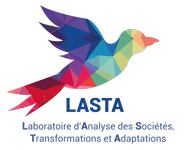Rethinking Asian Capitalism
The Achievements and Challenges of Vietnam Under Doi Moi (Palgrave Macmillan, juillet 2022)
TRAN Thi Anh-Dao (Ed.)
LASTA (Université de Rouen Normandie)
Institut de Recherche sur l’Asie du Sud-Est Contemporaine (IRASEC-CNRS)
Rethinking Asian Capitalism | SpringerLink
ISBN : 978-3-030-98103-7
DOI : 10.1007/978-3-030-98104-4
Résumé :
Ce livre vise à combler cette lacune : dans l'esprit de ce que la théorie de la régulation a fait en Europe et en Asie de l'Est, il tente de mieux comprendre la transformation à long terme des économies et des sociétés en Asie du Sud-Est. Plus précisément, il contribue à l'approche de la diversité des régimes socioéconomiques en examinant l'expérience vietnamienne durant et après le Doi Moi. D'un point de vue historique, le Vietnam est aujourd'hui cité comme "une réussite ou un miracle économique", tout comme le Japon dans les années 1980. Sous certains aspects, le paradigme du vol d’oies sauvages doit être approfondi pour fournir des enseignements utiles. La montée du néolibéralisme en Asie du Sud-Est a entraîné des changements significatifs à bien des égards. L'Asie jouant un rôle de plus en plus important dans l'économie mondiale, ce livre apporte une contribution importante à notre compréhension des dynamiques clés qui remodèlent le rôle de l'Asie.
Bien qu'il soit écrit essentiellement dans une perspective économique, ce livre est néanmoins destiné à toucher un public plus large. Il se situe au carrefour de deux domaines majeurs : l'économie (politique) et les études sur l'Asie (du Sud-Est). Les lecteurs souhaitent non seulement comprendre la transformation économique mais aussi certains aspects ou témoignages cachés (« les faits de l’ombre »), afin de pouvoir percevoir les autres dimensions mises en place dans une économie de marché. Cette analyse multidimensionnelle est développée en faisant appel à des chercheurs issus de divers horizons des sciences sociales. Une diversité d'approches de la trajectoire vietnamienne est fournie en combinant l'économie, l'anthropologie, la culturologie, la sociologie, l'ethnographie, l'histoire et les sciences politiques. Méthodologiquement pluraliste (incluant à la fois des études théoriques et empiriques), elle vise à donner une plus grande visibilité aux recherches des économistes hétérodoxes en économie politique comparée.
Cette publication est un outil pédagogique destiné à rappeler aux jeunes chercheurs et décideurs politiques qu'il y a beaucoup à apprendre du passé. Nous pensons qu'elle arrive à un moment où de grands changements sont sur le point de se produire en Asie du Sud-Est, où l’approche économique hétérodoxe reste cependant sous-étudiée. La thèse principale de ce livre est que le "moment néo-libéral" qui a suivi la chute du mur de Berlin doit être remis en question afin de mieux faire face aux défis à venir.
Summary :
This edited book aims to fill the gap. In the spirit of what régulation theory has done in Europe and East Asia, it attempts to better understand the long-run transformation of economies and societies in Southeast Asia. More precisely, it contributes to the approach on the renewed diversity of socioeconomic regimes by scrutinizing the Vietnamese experience during and after Doi Moi. From a historical perspective, Vietnam is nowadays cited as “an economic success or miracle” just as Japan was regarded in the 1980s. In some aspects, the flying geese paradigm needs to be further explored for useful insights. The rise of neo-liberalism in Southeast Asia has brought about significant changes in many ways. With Asia playing an increasingly important role in the world economy, this book makes an important contribution to our understanding of the key dynamics reshaping Asia’s role.
Despite being written basically from an economics perspective, the edited book is, nevertheless, intended to reach a much wider readership. It stands at the crossroads of two major fields, namely economics (political economy) and (Southeast) Asian studies. But readers wish not only to hear about the economic transformation but also to see certain hidden aspects or original evidence in order that they can perceive the other dimensions put in place in a market-oriented economy. To this end, the publication brings together scholars with diverse backgrounds in social sciences in order to take a multi-dimensional standpoint. With the aim of highlighting context-specific changes, a diversity of approaches to the Vietnamese trajectory is provided by combining economics, anthropology, culturology, sociology, ethnography, history and political science. Being methodologically pluralist (including both theoretical and empirical studies), it aims to give a higher profile to the research of heterodox economists in comparative political economy.
The publication is an educational tool to remind young scholars and policymakers that there is much to learn from the past. We believe that it comes at a time when great changes are about to take place in Southeast Asia, where heterodox economic approach is rather understudied. The main thesis of this book is that the “neo-liberal moment” that followed the collapse of the Berlin Wall should be questioned in order to better face the challenges ahead.
